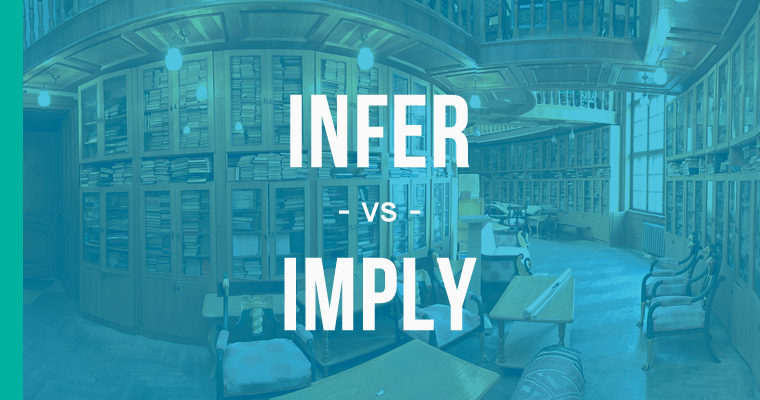Imply vs. Infer – How to Use Each Correctly

What’s the Difference Between Infer and Imply?
Contents
Infer and imply both are related to indirect information. However, they approach this meaning from two different angles, just like the word pairs give/take and borrow/lend.
Infer is a verb that means to find an answer based on reasoning rather than being told directly.
- Her son wouldn’t tell her where he had been. However, he reeked of booze and cigarettes so she inferred that he had been at a party.
Imply is also a verb. It means to suggest or hint without stating information directly.
- No, he didn’t call me stupid directly, but he implied it when he said he didn’t think I would understand!
Let’s look at a few ways to use these words in your sentences.
Using Infer in a Sentence
When to use infer: Infer means to conclude something based on evidence. It is similar to the verb deduce.
For example:
- I see the cookies are missing from the cookie jar. Your father didn’t eat them. I didn’t eat them. You are the only other person who was in the house. Can we infer that you ate these cookies?
- I never told you that I didn’t speak English. It’s not my fault that you chose to infer that I could only speak Chinese.
The most common error with these words is to use infer when you really mean imply. To maintain clarity, use imply for giving indirect information and use infer for figuring out indirect information.
Using Imply in a Sentence
When to use imply: Imply acts as a verb that means to suggest or hint something without stating it directly.
For example:
- He implied that he thought I was conceited when he said, “I see you’re taking selfies again.”
- She implied that she thought Americans were stupid when she said, “I’m surprised to see an American speaking Japanese so fluently!”
People imply information for several reasons. They might be trying to be polite by delicately avoiding saying something rude. Conversely, they might be trying to be rude in a discreet way. Finally, they might be trying to build suspense.
Remembering Infer vs. Imply
One way to remember the meanings for each of these words is to look at their spellings.
Infer is spelled with the letter f in the middle and r at the end. This is similar to the spelling of the word figure. This can help you remember that to infer something is to figure out what someone has hinted at but didn’t state directly.
Imply is spelled with the letter p, like the word propose. This can help you remember that both imply and propose involve stating something, as opposed to figuring something out.
Outside Examples
- It is easy to slip into a mode in which you infer your conversation partner’s motives and then start to argue. –Houston Chronicle
- It’s similarly hard to know the exact number of snakes at the park, but DuBois said it’s possible to infer from visitor spotting that the population is healthy. –Denver Post
- “Woods also implied that we force our son to be gender creative. Anybody who has followed our journey knows that is not true. I’ve written about how much easier our lives would be if both of our boys were straight and cisgender.” –OC Register
- About 6:40 a.m., the man entered a store in the 900 block of Northwest Highway, implied he had a gun, and demanded the employee give him money from the register, according to a statement from Park Ridge police. –Chicago Sun Times
Quiz: Imply vs. Infe
Instructions: Fill in the blank with the correct word, either imply or infer.
- I don’t like that professor. He _______________ that women should always be nurses and never doctors.
- What are you ______________? Just tell me what you mean plain and simple. Don’t just hint at it!
- My daughter never tells me anything about her life. I’m forced to ____________ everything I know about her.
See answers below.
Article Summary
Should I use infer or imply? Generally speaking, use infer when receiving indirect information and imply for giving indirect information.
- Infer means to conclude an answer based on evidence.
- Imply means to suggest something without saying it outright.
Although these both deal with indirect hints as opposed to saying something frankly, they are no more alike than listen and speak.
Answers from Quiz
- implied
- implying
- infer
